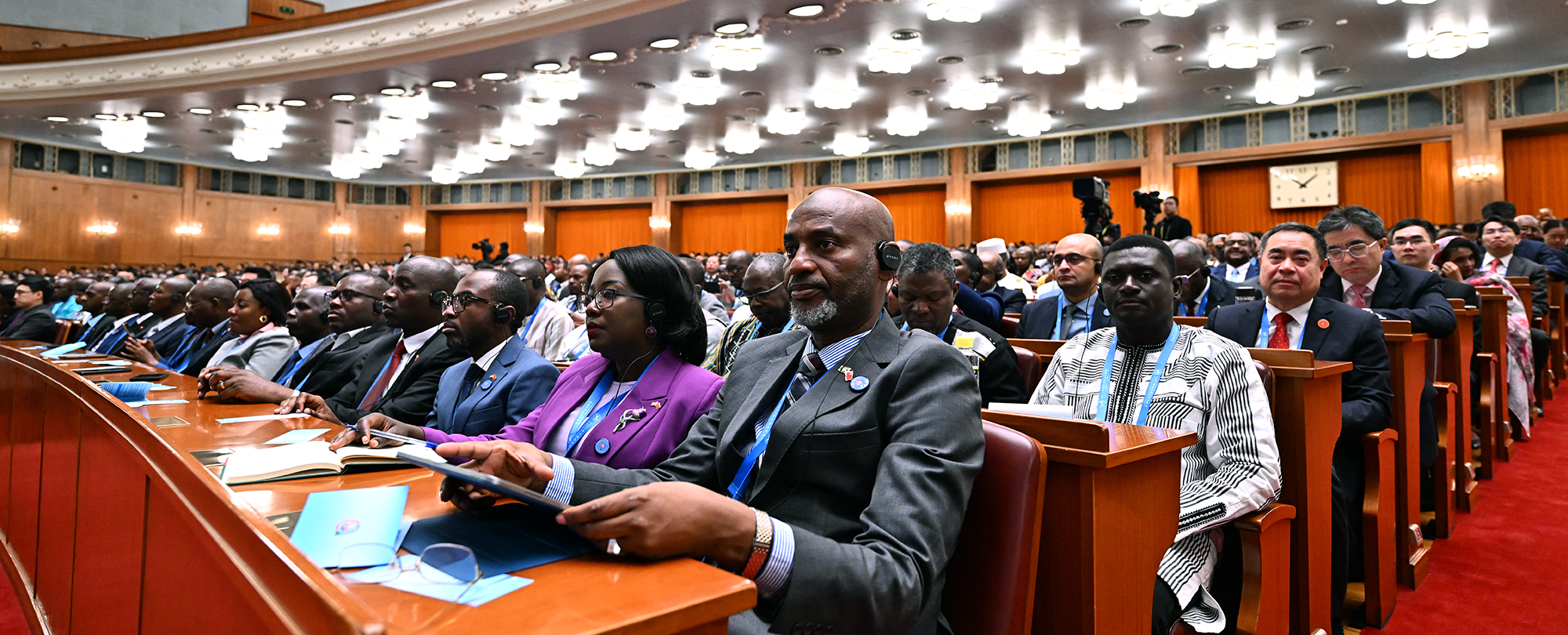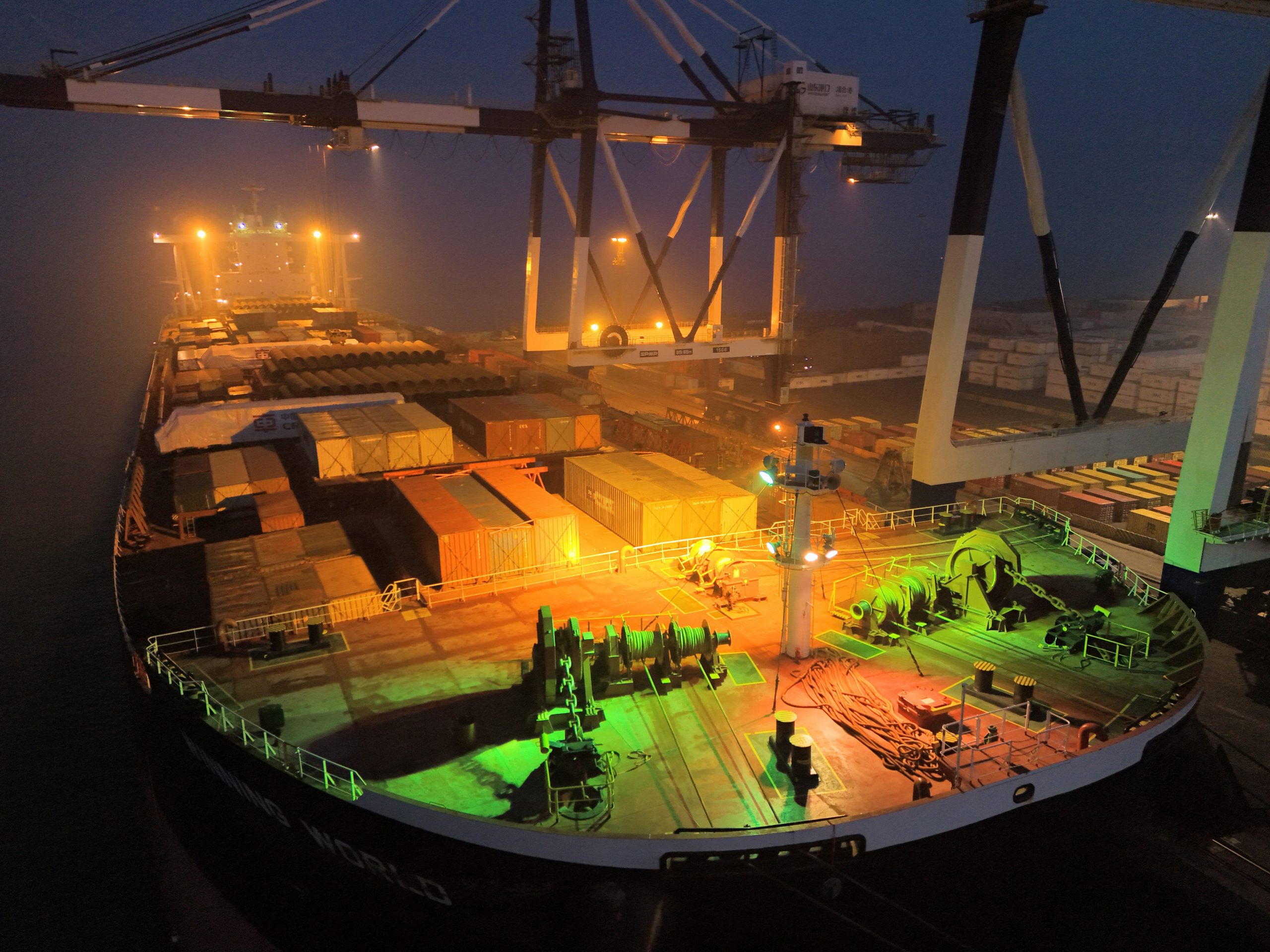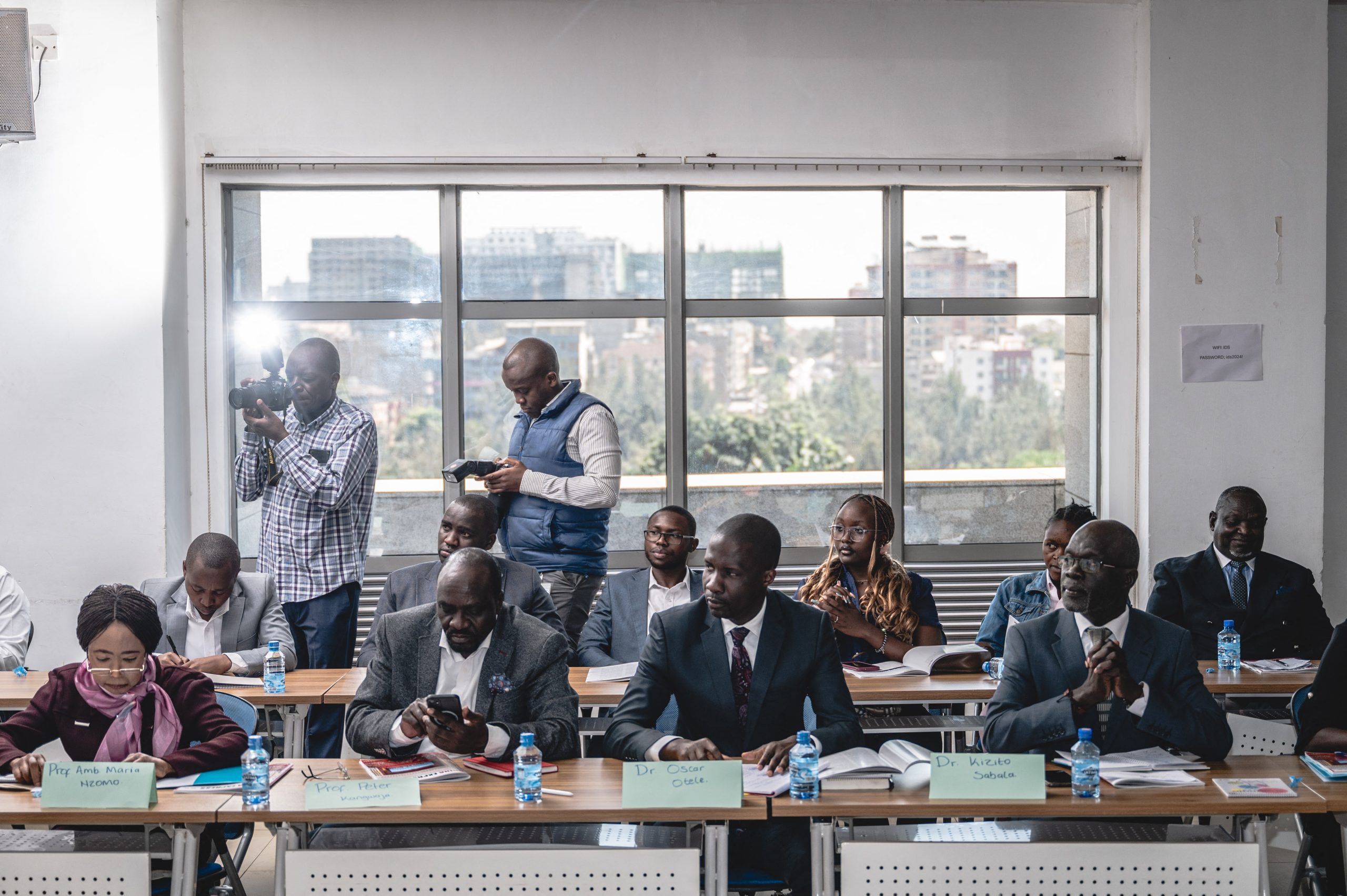
The 2024 Summit of the Forum on China-Africa Cooperation (FOCAC) opening in Beijing. (Xinhua/Yan Yan)
As attention shifts to implementing resolutions of the Ninth Forum on China-Africa Cooperation (FOCAC), questions are being asked about whether African countries have the agency to shape the relationship going forward. Many African observers remain concerned that FOCAC remains deeply asymmetric, with the Chinese side exercising more control and therefore dictating the agenda. African countries are perceived to take the back seat or mostly go along with Chinese positions, even if these might undermine Africa’s fundamental interests.
Many African observers remain concerned that FOCAC remains deeply asymmetric, with the Chinese side exercising more control and therefore dictating the agenda.
The FOCAC Beijing Action Plan (2025-2027) incorporates the African Union’s (AU) Agenda 2063 (Africa’s development master plan), the African Development Bank’s Program for Infrastructure Development in Africa (PIDA), and the African Continental Free Trade Area (AfCTA) into FOCAC. However, it is firmly anchored on Chinese national security concepts like the Global Security Initiative (GSI) that promotes distinct Chinese security norms and practices that advance China’s larger effort to shape the global order to accommodate its rise. Going along with such concepts could inadvertently draw African countries into China’s geostrategic sphere, which in turn could undermine Africa’s strategic posture regarding geostrategic rivalries.
FOCAC has also become a channel for China to socialize and legitimize the GSI’s twin concepts, the Global Development Initiative (GDI) and the Global Civilization Initiative (GCI), to frame its engagements in developing countries. The expanded military and security program outlined in the new FOCAC Beijing Action Plan is described as “early-stage implementation of the GSI.” As longtime China scholar Chris Alden of the London School of Economics notes, “this FOCAC is perhaps the most significant integration of these concepts into policy practice.”
[FOCAC 2024] does not lay out how China can work with African countries to reduce their debt burdens.
African interests in these outcomes remain unclear. The new Action Plan is silent on the African common position on United Nations Security Council reform, also known as the 2005 Ezulwini Consensus, which seeks permanent African seats on the Council along with veto power.
It also does not offer clear solutions to reverse the $64-billion annual trade deficit between China and African countries—an issue African leaders pressed hard for, in the lead up to and at the FOCAC summit. While interest-free loan repayments due at the end of 2024 for select countries were waived, it does not lay out how China can work with African countries to reduce their debt burdens. As Africa’s top bilateral creditor, holding about 12 percent of Africa’s debt, there have been growing calls on China to prioritize debt sustainability in its dealings in Africa, and for African countries to borrow more responsibly.
China continues to lend bilaterally to maintain strategic relationships even as it tries to reduce its risk exposure by channeling more loans through African regional multilateral banks. In 2023, Chinese lenders issued loans to long-term borrowers Angola, Egypt, Ethiopia, Kenya, and Nigeria—all of which are facing elevated levels of debt. Fresh loans were also provided to military regimes in crisis-hit Burkina Faso, Mali, and Niger. Loan dependency, in turn, hinders the ability of debtor countries to act with greater agency as they are vulnerable to coercion. The problem is magnified when borrowing is unrestrained, and creditors and debtors fail to put practices in place to ensure debt sustainability.
The power imbalance between China and Africa even extends to which African countries attended the summit. FOCAC 2024 saw the participation of the military juntas in Burkina Faso, Guinea, Mali, Niger, and Sudan, all of whom received red carpet treatment in Beijing alongside other leaders. This caused great discomfort (albeit quietly) among African participants, particularly since the AU had reaffirmed the suspension of these juntas just prior to the summit. Africa’s muted response to China’s effort to cultivate coup regimes, despite its violation of the AU’s longstanding policy against unconstitutional changes of government, further underscores Africa’s relative weakness vis-à-vis China.
Impediments to Rebalancing the Africa-China Relationship
To ensure implementation of FOCAC commitments and advance African interests, heightened and sustained efforts will be needed to correct the imbalances in the Africa-China relationship through to the next summit.
Lack of an Evidence-Based Tracking System to Verify Commitments
FOCAC’s headline commitments are difficult to evaluate due to the lack of a publicly accessible reporting system. At the last FOCAC summit in 2021, China offered $10 billion in grants to boost African exports into Chinese markets. However, there is no transparent reporting on how these funds were expensed, which African institutions had management authority over them, who the beneficiaries were, and what they exported to China.
China also pledged to encourage Chinese businesses to invest no less than $10 billion in manufacturing, agriculture, green, and digital economies. However, it is difficult to assess whether China’s investment stock in Africa between 2021 and 2024 came from this commitment and, if so, whether the target was achieved, surpassed, or fell short. An independent and accessible system to follow up, analyze, evaluate, and report on each commitment would help African members track FOCAC more systematically, identify gaps, and propose adjustments.

Africa bound cargo at the port of Yantai in Shandong province, China. (Photo: Costfoto / NurPhoto)
Such a publicly available reporting mechanism would strengthen African governments’ negotiating position to ensure that commitments are firmly aligned to African citizen priorities. This would also facilitate a wider interrogation of these agreements, including by the public and outside experts. As Tanzanian China specialist Rosemary Mnongwa notes, “transparency and accountability play crucial roles in mitigating imbalances and reducing the risk of corruption in deals between African governments and Chinese entities.”
Absence of an Integrated African Approach
While FOCAC has been around for 24 years, African countries have not maximized opportunities to work together on common issues that can leverage their collective strength. The European Union (EU)—on which critical parts of the AU is modelled—offers some lessons. EU members all engage bilaterally with China but coordinate on cross-cutting issues through the European External Action Service. The European Parliament has a dedicated delegation for relations with China and provides a mechanism for national legislatures to shape Europe’s China policy. African countries have not reaped the benefits of such coordination. As such, key bilateral goals like eliminating the trade and tariff barriers that hamper African access to Chinese markets have been difficult to achieve. These cannot be accomplished without better coordination among the AU, regional economic communities (RECs), and member states.
Limited Long-Term African Vision
“Developing a common African position is laborious, but the process is required to get buy-in by states and has come to be seen as a political asset,” notes Ambassador Bankole Adeole, the AU Commissioner for Political Affairs, Peace, and Security. Ahead of the 2018 FOCAC, leading African specialists on China developed a framework strategy for engagement as a resource for African countries. However, the outcomes from this effort, or a strategic planning process more generally, have not been institutionalized. Operationalizing such a framework strategy would form a basis for policy debates through to the next FOCAC summit in 2027.
Undeveloped Institutional Process to Harmonize African Priorities
African [FOCAC] participants lack an internal mechanism to bring them together to harmonize before meeting their Chinese counterparts.
Paradoxically, while FOCAC is built around a cascade of networking events and exchanges held every 1-3 months across different sectors, it is not clear how much real consultation and two-way exchanges of views occurs. Hence, the effects from African leadership, influence, and initiative in driving FOCAC’s numerous subforums are difficult to measure. Part of the problem is that African participants lack an internal mechanism to bring them together to harmonize before meeting their Chinese counterparts in FOCAC subforums and planning committees. The Community of Latin American and Caribbean States (CELAC) has arguably been more successful as their coordination structures overlap with the China-CELAC committees. Hence, they can meet on their own within CELAC ahead of China-CELAC engagements—a lesson African countries could borrow as they reimagine their engagements with FOCAC.
Innovations that Can Elevate African Agency in Africa-China Relations
Drawing lessons from these impediments and building on emerging initiatives to strengthen African agency highlights the following building blocks for advancing African interests in the continent’s relations with China.
Reduce debt dependency by diversifying partners. While bilateral lending is still an important means of financing critical infrastructure, broadening the scope and engagement of Africa’s multilateral banks in new lending projects is an increasingly attractive means of diversifying and reducing Africa’s bilateral debt imbalance (and vulnerability) with China while elevating lending standards.
Over 80 institutions belong to the Association of African Development Finance Institutions (AADFI), which has been in existence since 1975. The largest grouping within it is called the Alliance of African Multilateral Financial Institutions (AAMFI) consisting of eight members with assets of over $50 billion.
Broadening the scope and engagement of Africa’s multilateral banks in new lending projects is an increasingly attractive means of reducing Africa’s bilateral debt imbalance with China.
The African Development Bank (AfDB), for example, allocates and administers the Africa Growing Together Fund—a $2-billion, 10-year investment made by the People’s Bank of China. In 2023, over half of China’s total lending of $2.59 billion went to multilateral and nationally owned banks. With 54 African and 28 non-African shareholders including Canada, Germany, Japan, and the United States, the AfDB offers more oversight and assurance that funded projects will serve African citizen interests. The AfDB, together with the European Commission, the United States, the Africa Finance Cooperation, and the governments of Angola, the Democratic Republic of the Congo (DRC), and Zambia is also financing the Lobito Corridor, a railway project stretching from the Angolan port of Lobito through Kolwezi in the DRC to Kabwe in Zambia.
African civil society institutions specializing in debt and development finance have been at the forefront of promoting this type of lending to address the challenge of securing infrastructure without falling into debt distress. Development Reimagined, an African private sector institution, regularly convenes African multilateral banks, the AU, African governments, and private financial institutions around these issues. At an event at FOCAC 2024, attended by executives from AAMFI and the AU, Development Reimagined laid out a five-point vision to strengthen these institutions, expand their lending, give borrowers greater choices, and deepen safeguards.
Enhance the AU’s representational authority and engagement. One of the institutional reforms called for by the AU in “The Imperative to Strengthen Our Union,” is to streamline and empower a small number of African experts to serve as the continent’s representatives when engaging external powers like China and negotiating with these external actors on the continent’s behalf.
If implemented, it would mean ending the practice of sending 53 presidential delegations to the triennial FOCAC events (and other summits). Instead, African energies would be concentrated on developing a cadre of technically proficient China experts that would apply best practices for continental negotiations while creating institutional continuity to Africa’s relations with China. “On a wider level, the proposed reforms can be seen as an attempt to address the power gap that has structured Africa–China relations,” says Cobus van Staden of the South African Institute of International Affairs.
The AU Commission (AUC) has shown that it can deliver for Africa when it is empowered to do so by the heads of state. In 2024, the AUC negotiated a working coordination mechanism with China’s National Development and Reform Commission (NDRC) to align China’s Belt and Road investments with the African Development Bank’s Program for Infrastructure Development in Africa (PIDA). The NDRC is the agency that manages Beijing’s Belt and Road Initiative.
However, there is a lingering lack of consensus among African heads of state on how much authority to grant the AUC, with many wanting to keep it on a tight leash. This inhibits the adoption of such AU policy innovations.

Attendees during a seminar on “Strengthening Sino-African Relations: Reflections on Two Decades of FOCAC” at the University of Nairobi. (Photo: Xinhua / Wang Guansen
Improve African monitoring, evaluation, and reporting. The AUC formally tasked the New Partnership for African Development (NEPAD) in 2024 with implementing a monitoring and evaluation framework for all African partnerships with external actors, including FOCAC. NEPAD has also been mandated to coordinate implementation of the 10 regional connectivity projects earmarked in the FOCAC Beijing Action Plan (2025-2027). This puts NEPAD in a position to collect data and issue regular reports on FOCAC to review the state of implementation of all commitments. That would create a new standard of accountability and provide much needed data for informed public engagement.
Tap external African expertise. There is a growing body of Chinese-trained African professionals from the diaspora who understand Chinese culture, language, and negotiation style. This has been accompanied by a rise in associations of African scholars and other independent knowledge networks that specialize in Africa-China relations. While some African countries have recruited from these circles to assist their ministries back home and their embassies in Beijing, these skills largely remain untapped. They thus represent a readily available human resource pool that can enhance Africa’s expertise, institutional memory, and evidence-based interests when engaging China.
Building Forward
African countries can maximize the benefits of FOCAC, mitigate the risks, and put the relationship on a more equal footing. For this to happen, they must diagnose the strategic impediments that undermine their ability to exert greater agency and adopt innovative policy responses. Addressing the asymmetric relationship between African countries and Chinese entities is not a task for governments alone but rather can draw on a growing community of independent Africa-China experts to advance Africa’s strategic agency.
Additional Resources
- Bonnie Glaser, “China and Africa: 2024 FOCAC Outcomes,” China Global Podcast Episode 85, German Marshall Fund, September 24, 2024.
- Chris Alden and Lukas Fiala, “FOCAC and the Recalibration of Africa-China Relations,” China Global South Project, September 13, 2024.
- Gyude Moore, “At FOCAC, China Renewed Commitments to Africa. Here’s What Needs to Happen Next,” Blog Post, Center for Global Development, September 12, 2024.
- Eric Olander, “Chinese, African Perspectives on the FOCAC Summit,” The China in Africa Podcast, China Global South Project, September 3, 2024.
- Cobus Van Staden, “FOCAC and the Africa Plus One Summit: Where to Next?,” China Global South Project, September 2, 2024.
- Paul Nantulya, “FOCAC 2024: Elevating African Interests Beyond the Africa-China Summit,” Spotlight, Africa Center for Strategic Studies, August 20, 2024.
More on: China in Africa

